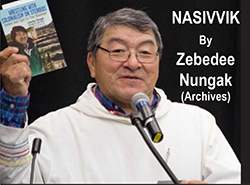
NASIVVIK By Zebedee Nungak,
Windspeaker Columnist; Archives 2006
Nasivvik is an Inuktitut word that means vantage point. It can be a height of land, a hummock of ice, or any place of elevation that affords observers a clear view of their surroundings to make good observations.
One has to take pause to appreciate the sheer amount of work and preparation that must have gone into pulling off the First Ministers' Meeting (FMM) on Aboriginal issues held Nov. 24 and 25 in Kelowna, B.C. The dynamics of securing commitments from the federal, provincial, and territorial governments to deal tangibly with Aboriginal issues is a supreme accomplishment in itself, above and beyond the results of the gathering.
Back in the 1980s, governments in Canada sat down with Aboriginal leaders at four First Ministers' conferences (FMC) on Aboriginal Affairs. These meetings were mandatory under the provision recognizing the Indian, Inuit, and Métis people in Canada's repatriated Constitution. Some jurisdictions attended those conferences only because they were required by law to do so. Had they any other option, I'm quite sure several governments would rather not have attended.
The FMCs of 1983 to 1987 did not accomplish the recognition by governments of the Aboriginal right to self-determination. But one of their great by-products was general public education about the Aboriginal fact in Canada. With the conferences televised for all Canadians to see, everybody could start to understand just how low in Canada's national political totem pole Aboriginal people were embedded. This state of affairs could not be left un-corrected forever.
A political mountaineering journey of sorts was launched with those 1980s FMCs, even if several of Canada's provinces were dragged up the slope, vigorously resisting all the way to its summit. The jurisdictions did not arrive at the summit all at the same time. But that they had all eventually reached a common political station was demonstrated by what was accomplished in Kelowna.
No politician, Aboriginal or non-Aboriginal, can belittle what was achieved at Kelowna.
Agreement to commit over $5 billion over five years for education, housing and infrastructure, relationships and accountability, economic opportunity and health care, is a political watershed, reached to everybody's credit. After this, we might all dare to hope to live more adequately, if not happily, ever after.
But never again in Canada's national political life should such a First Ministers' Meeting be held under the conditions and circumstances in which this meeting was conducted. People might ask, "Why? Shouldn't we be thankful that the meeting was even possible, and held?" No! And here is why:
The Kelowna FMM teetered on a "Will It? Won't It?" seesaw for several anxious days as the life of the country's Parliament hung in the hands of various political gods who would determine when to pull the plug on the life-support systems Parliament was gasping its last from. Did NDP leader Jack Layton get up in a good mood that morning? Were other politicians feeling particularly merciful that day? Kelowna's fortunes hinged upon such whims.
Imagine other vitally important national issues being wrestled with in the same turmoil-saturated atmosphere: Military allocations. Health care. Gun control. Same-sex marriage. Woe to anybody who might put any of these at risk! Meanwhile, on another track, some bills were not merely fast-tracked, but bullet-trained through the legislative process. Politicians can work incredibly fast when they set their minds to it. They can also be dim-witted dullards on subjects that really matter, when they're left to their own devices.
Kelowna's life or death pendulum swings underlined another glaring deficiency in Canada's political life: The great lack of Aboriginal Members of Parliament. Presently, there's no identifiable Aboriginal caucus among the parties that can influence a Kelowna-like situation for the better. The handful of Aboriginal MPs, now there by seemingly accidental aberration, could not have saved Kelowna if the political constellations had aligned themselves against it.
One of the next great tasks at hand for Aboriginal leaders is persuading Parliament to design a special accommodation for a block of Aboriginal seats in Parliament. To help de-mystify such a concept, I've often trotted out New Zealand's practice of reserving seven of its Parliament's 120 seats for its Indigenous Maori population. An enlightened, civilized fellow country in the Commonwealth has already dared to do this.
By simply adopting New Zealand's numerical formula, Canada would reserve 17.5 Parliamentary seats for Aboriginal people, out of its present 301 seats. These might not be overwhelming numbers, but they'd be enough to swing Jack Layton's fickle moods into the right condition, and to influence key politicians' mercy negatives to just the right balance to keep Kelowna out of the political danger zone.
One other indicator of positive political development since the 1980s FMC days is B.C. Premier Gordon Campbell's speeches in Kelowna. He's not reading from a scripted text, and looks very much like he's speaking from the heart. Such positive words about Aboriginal issues by a B.C. premier are a genuinely pleasant change. I might have to publicly announce that I am not, repeat not, his speechwriter.
